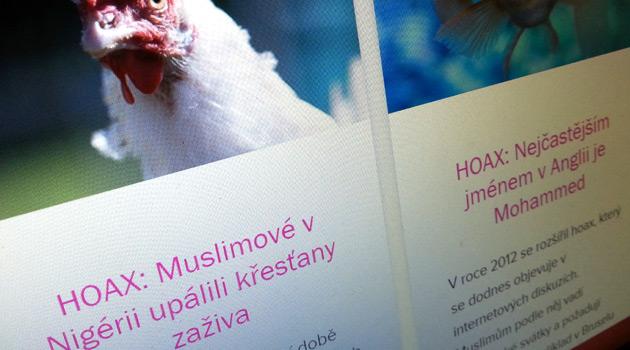Czech Human Rights Minister meets with management of Hate Free project to discuss its future

Czech Human Rights Minister Jan Chvojka (Czech Social Democratic Party – ČSSD) met on 7 February with the leadership of the Czech Government’s campaign against hate violence, Hate Free Culture. The three-year project, scheduled to end in April, combats hate speech and xenophobia as well as refuting fake news and hoaxes, mainly in the online environment.
According to a press release, Chvojka’s team will ensure the sustainability of the project after April in accordance with the funding rules. The Office of the Government has undertaken anti-racist campaigns since 1998 and will continue to do so.
“The conclusion of our negotiations with the minister is that the project financed by Norway Grants is logically ending at the close of April. We will meet again in two weeks to discuss its sustainability after that,” Lukáš Houdek, the coordinator of Hate Free Culture, told news server Romea.cz.
“This campaign should not be about preaching to the choir,” Chvojka said, “but about working with ordinary people, about explaining that anybody can encounter such violence because of where they come from or how they look.” According to the Human Rights Minister, it is necessary that the campaign’s argumentation against hate violence be comprehensible not just to intellectuals and students in terms of format and vocabulary, but to anybody using the Internet and moving about in society.
Given the deadlines for assessing projects and applying for new ones, after the campaign’s closure in April there will be an eight-month period during which it will wind down. During that time Chvojka and his team will assess the closing project and work on designing its continuation.
“Campaigns are, in my opinion, primarily tasks for civil society,” Chvojka said, “but the Office of the Government has supported such activities in the past and will continue to do so where we are convinced that the project will be effective. We will be negotiating the concrete form of the next campaign to be implemented by the Office of the Government in the months to come.”
News server Rozhlas.cz reported that Chvojka has denied wanting to target the Hate Free project for closure. “While the project is closing at the end of April, the terms are that it must continue until the end of this year in order to be sustainable. If it does not continue we would have to return all of the money to Norway Grants. From the end of April until the beginning of next year we have time to assess whether the project was successful, whether it is possible to continue it, or whether we will do a new one,” he told Czech Radio.
Czech Prime Minister Sobotka surprised by Chvojka’s statement on Hate Free
The Czech media had previously reported that the Hate Free campaign was “closing”. Czech Prime Minister Bohuslav Sobotka, participating in a debate with the Idealists association, said in response to the news that he would review the details of Chvojka’s decision not to continue the Hate Free Culture project with the minister.
The PM claimed to be surprised by the minister’s reported decision. “We should not abandon our efforts to counter the dissemination of hatred and xenophobia in society, and at the end of the day as Human Rights Minister that’s in his job description. However, it seems there have been some objective problems with the project,” news server Novinky.cz reported Sobotka as saying.
The financing of the Hate Free Culture project was questioned recently by the Czech daily Mf DNES, according to which a former head of the project, Nikola Křístek, had also been working simultaneously for the AISIS association when that NGO received a public tender worth CZK 5 million. Former Human Rights Minister Jiří Dienstbier (ČSSD) has objected to the media’s characterization of those arrangements.
Dienstbier, who is still a senator today, told news server TÝDEN.CZ that he vetted all the information about the project’s financing. “All of it was done correctly and there was no abuse,” he said.
Křístek, according to Dienstbier, withdrew after ascertaining that AISIS was seeking the public tender. He also noted that Křístek was merely an employee of the association, which aims to improve education in the Czech Republic.
“If that problem was meant to be a reason to close the project, then I consider it a pretext. I decidedly do not believe a project like this should end because of it,” Senator Dienstbier said, adding that he had not yet met with his successor to discuss the future of the Hate Free Culture campaign because he had not been given any room to express his opinion of it.
According to news server Aktuálně.cz, Křístek is scheduled to testify to an ethics commission over the issue. “The commission will say whether Křístek’s behavior violated internal ethics rules,” Chvojka said.
“This did not cross the line legally. Formally it was in accordance with the law, but morally, in my opinion, it was not,” Chvojka told news server Aktuálně.cz.
